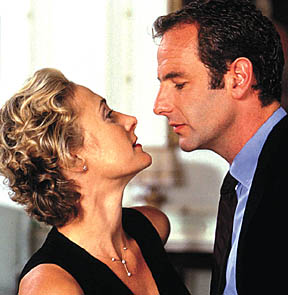
Backstage drama:
finding sponsors
Originally published in Current,
Jan. 13, 2003
By Karen Everhart
For the first time in its 32-year history, the drama series that most viewers inextricably link with PBS is looking for an underwriter.
After 2004, ExxonMobil will end its sponsorship of Masterpiece Theatre, the series that made high-end British drama a PBS signature. Mobil Corp. backed the series as its sole funder from the start in 1971 and continued for so long and so generously that PBS in 1996 added the company’s name to the series title.
When Exxon acquired Mobil in 1999 the company’s philanthropic priorities shifted to other public relations needs, particularly in public health and environmental issues, according to a company spokeswoman. The long delay in approving expanded 30-second underwriting credits—PBS is now moving in that direction—did not influence ExxonMobil’s decision, she said.
Public TV execs are optimistic about their prospects for recruiting a new sponsor within the next 18 months, but while they search for a deep-pocketed patron for the cornerstone series, drama on PBS looks as vulnerable as one of BBC’s Victorian ingenues. Drama is the most expensive genre of television, and public TV programmers and producers struggle perennially with the cost.
Producing drama for public TV is "very, very difficult because of the quality of drama on television today," commented Jac Venza, director of arts and culture programming for WNET in New York. "Whether people like it or not, the quality of production is much higher than it’s ever been before. We’ve got to keep the standards up, and it costs $1.5 million to do a decent show."
Period drama in particular has become so expensive that "no one does it alone anymore," said Rebecca Eaton, Masterpiece Theatre executive producer. "Complicated partnerships are being put together every day" involving domestic and international rights. "Finding a project that truly suits international partners is a tricky business."
Updike, Hillerman, Mary Tyler Moore
The network, meanwhile, is renewing or considering renewal of several original drama series it has launched since the mid-1990s.
- Masterpiece Theatre’s American Collection will deliver two more titles to PBS. Eaton anticipates a major announcement within the next month on the first of these, which will air in the fall. Writers are adapting John Updike’s Rabbit novels for a four-hour mini-series. WGBH partially financed the Updike series through a coproduction deal with BBC and Alliance Atlantis.
- PBS plans to commission at least two more Tony Hillerman stories for Mystery!, following the well-received debut of "Skinwalkers." The next Hillerman story to be adapted is A Thief of Time. Alice Arlen, who co-wrote the screenplay for the movie Silkwood with Nora Ephron and was nominated for an Oscar, will deliver a draft script this month, according to Jacoba Atlas, PBS co-chief programmer. The new Hillerman specials were funded through the same co-production deal with Carlton International that partially financed the first. Underwriting reps continue to solicit corporate sponsors for this new mystery strand.
- The network has ordered eight more PBS Hollywood Presents dramas from KCET over the next two years, according to Barbara Goen, station spokeswoman. "The Gin Game," a drama that airs this spring and reunites Mary Tyler Moore and Dick Van Dyke, completes the package of four programs that PBS first commissioned from this series. The Los Angeles station, which also presents American Family, continues to seek corporate sponsors for a second season of the Latino family drama.
- Stage on Screen, a series of stage-based dramas that debuted two years ago with backing from CPB, PBS and foundations, recently delivered the last program in its initial funding package. PBS is negotiating with WNET for renewals on all its signature series, said Atlas. "That worked really well for us" by delivering a special niche of theatrical dramas, she said.
Also, Mystery!, which lost its Mobil funding six years ago, will bring back its British sleuths again in summer 2004. "We’re looking at how to keep this series alive," said Atlas. PBS "definitely wants to keep it as a summer series." PBS funded the series for summer 2002 and 2003.
CPB committed substantial funding to these new drama strands—including its largest-ever grant of $15 million to the American Collection—and co-production deals and foundation support helped producers meet their budgets. American Collection and American Family were the only two to attract major corporate sponsors.
Through Mobil’s exceptional patronage—by far the largest corporate aid to public TV—Masterpiece Theatre producers at WGBH in Boston were largely insulated from these funding pressures. Mobil covered the entire cost of acquiring, repackaging and promoting British dramas for PBS, which runs about $10 million a year. Over 32 years, ExxonMobil spent more than $250 million on public TV programming and promotion. This includes sponsorship of the British import series Mystery! for 17 years, ending in 1996.
Without the oil company’s commitment, it’s doubtful that public TV could have established its high-end strand of British drama on its own, let alone built it into such a powerful television brand.
High hopes for an icon
ExxonMobil "made drama come alive on public TV in a way that it had never been before, and sustained it for three decades," said Lance Ozier, v.p. for national program marketing at WGBH.
Even though Mystery! struggled without sponsors a few years after Mobil withdrew and PBS reduced it from a year-round series to a summer treat, the odds are high that Masterpiece Theatre can avoid the same fate, he said.
"If you had to name three brands that totally capture public broadcasting, this would be one of them," he said. "Masterpiece Theatre has the depth that Mystery! didn’t have in the same kind of way."
"A fair number" of companies contacted WGBH about Masterpiece Theatre sponsorship shortly after ExxonMobil’s announcement, he added. "We’re hopeful, but it’s early on."
"We are confident that we can find another underwriter," said Atlas. "It’s an icon series that has an honored place in the PBS schedule. We learned that very quickly when we moved it to Monday nights." PBS moved Masterpiece Theatre back to Sunday nights last fall after it found that its loyal audience of British drama fans wouldn’t follow the series to a Monday night slot.
Masterpiece Theatre’s special status as a television brand, so closely aligned with PBS and its affluent, well-educated and loyal audience, make it especially attractive to underwriters, noted Eaton. "It has a huge constituency among PBS members" and is cited as one of the most valued programs in public TV membership surveys, she said.
A sequel to the Forsyte Saga, which built a cumulative audience of 16 million viewers last fall during its Masterpiece Theatre debut, is scheduled to air in January 2004. A new adaptation of Dr. Zhivago also is slated for Masterpiece Theatre’s 2003-04 season.

Steam rises from Caroline Goodall and Robson Green in Masterpiece Theatre's Jan. 26 [2003] offering, "Me & Mrs. Jones." (Photo copyright by Granada.)
Web page posted Jan.
17, 2003
Current
The newspaper about public television and radio
in the United States
A service of Current Publishing Committee, Takoma Park, Md.
E-mail: web![]() current.org
current.org
301-270-7240
Copyright 2003

